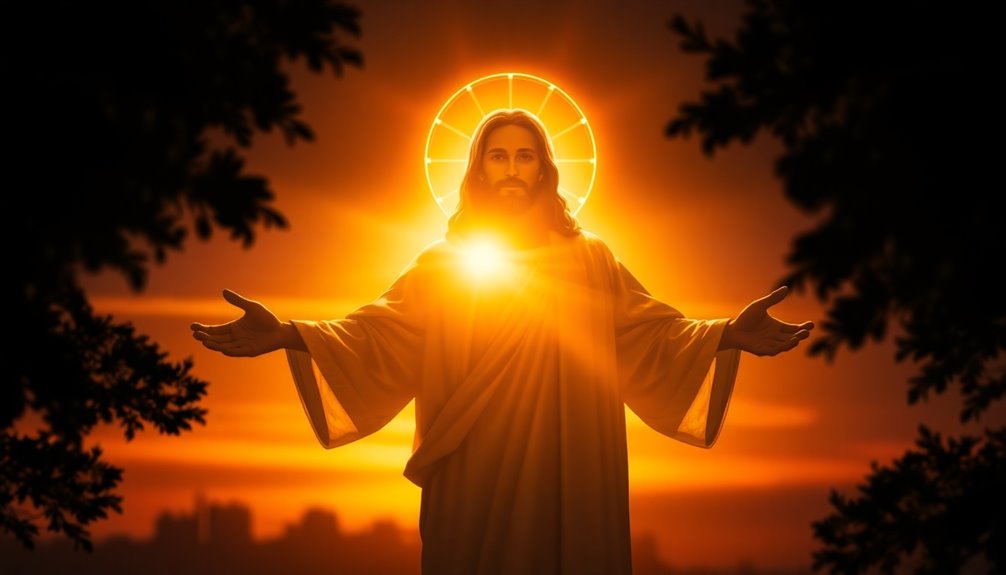Jesus is the Light of the World, offering you guidance, hope, and spiritual truth. In John 8:12, He declares this, symbolizing salvation and the path out of darkness. When you embrace Him, you embark on a transformative journey that leads to spiritual freedom. Light represents divine truth and contrasts with the darkness of sin. You're called to reflect His light through good works, showing His love and compassion to others. If you're looking to understand more about His role and the significance of light in your life, there's a lot more to explore about this profound concept.
Key Takeaways
- Jesus is described as the Light of the World, symbolizing spiritual truth and guidance for believers (John 8:12).
- Light represents salvation, hope, and eternal life, contrasting with darkness, which signifies sin and spiritual blindness.
- Embracing Jesus leads to a transformative journey, empowering believers to reflect His light through good works (Matthew 5:14-16).
- Jesus' authority as the source of spiritual truth is often misunderstood, leading to skepticism and spiritual blindness (John 14:6).
- Daily acts of kindness and community service exemplify Christ's love and can serve as platforms for sharing His message of hope.
Introduction
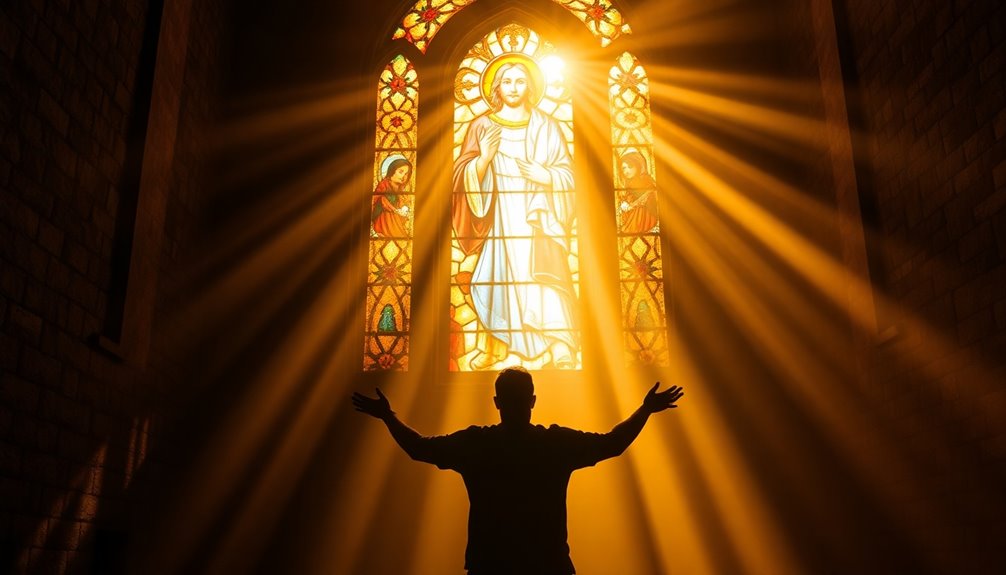
In John 8:12, Jesus boldly claims, "I am the Light of the World," inviting you into a profound understanding of His role as the ultimate source of spiritual truth. This declaration, made during the Feast of Booths in Jerusalem, highlights the stark contrast between His divine light and the spiritual darkness that often surrounds you.
Jesus embodies the metaphor of light, signifying salvation, hope, and eternal life, offering you a clear path to a deeper relationship with God.
When you embrace Jesus as the Light, you're not just gaining insight; you're stepping into a transformative journey. His light illuminates the way, ensuring that you won't walk in darkness. This assurance means that you can trust in His guidance and experience true spiritual freedom.
Moreover, as a believer, you're called to reflect this light in your own life. By demonstrating good works and living out your faith, you can help guide others toward Christ. In doing so, you become a beacon of hope, sharing the light that Jesus offers to a world in need.
Understanding Jesus as the Light of the World empowers you to live a life filled with purpose and direction.
Scriptural Basis for Light

When you explore the scriptural basis for light, you'll find powerful references that highlight Jesus' role as the ultimate source of truth.
From His declaration in John 8:12 to the prophetic imagery in Malachi 4:2, the Bible consistently paints Him as the light that guides and saves.
As you look closer, you'll see how these passages not only affirm His identity but also challenge you to reflect His light in your own life.
Primary Bible References
Throughout the New Testament, Jesus clearly identifies Himself as the Light of the World, starting with His declaration in John 8:12. Here, He emphasizes that He's the exclusive source of spiritual truth and guidance, shining brightly in a world often engulfed in darkness.
This theme of light is rooted in prophecy, as seen in Isaiah 9:2, which foretells a great light shining upon those in darkness, fulfilled in Jesus' birth and ministry. Malachi 4:2 further highlights the Messiah as the "sun of righteousness," symbolizing the healing and transformative power of the light He brings into our lives.
In John 1:4, you're reminded that in Jesus was life, and that life was the light of men. This key connection underscores how essential spiritual life is to divine illumination.
Moreover, John 12:46 reinforces the idea that Jesus came into the world as light, offering salvation and the chance to escape spiritual darkness for all who believe in Him.
These primary references collectively illustrate how Jesus, the Light of the World, continuously seeks to guide you out of darkness and into His marvelous light.
Secondary Bible References
The scriptural foundation for understanding Jesus as the Light of the World extends beyond primary references, revealing a rich tapestry of secondary verses that further illuminate His role. Isaiah 9:5 prophesies a light that brings joy and deliverance, identifying Jesus Christ as the fulfillment of this promise.
Similarly, Malachi 4:2 describes the Messiah as the "sun of righteousness," highlighting His healing and transformative power.
In John 12:46, Jesus states, "I have come into the world as a light, so that no one who believes in me should stay in darkness." This underscores His mission to guide us toward spiritual truth.
Ephesians 5:8 encourages you to "live as children of light," reminding you that the light of life transforms your existence, enabling you to reflect Christ's light in the world.
Finally, Revelation 21:23 paints a picture of the New Jerusalem, where God's glory illuminates the future, affirming Jesus as the eternal light for His people.
These secondary references collectively deepen your understanding of Jesus Christ's role as the ultimate source of light and hope in your life.
Jewish Festival of Lights
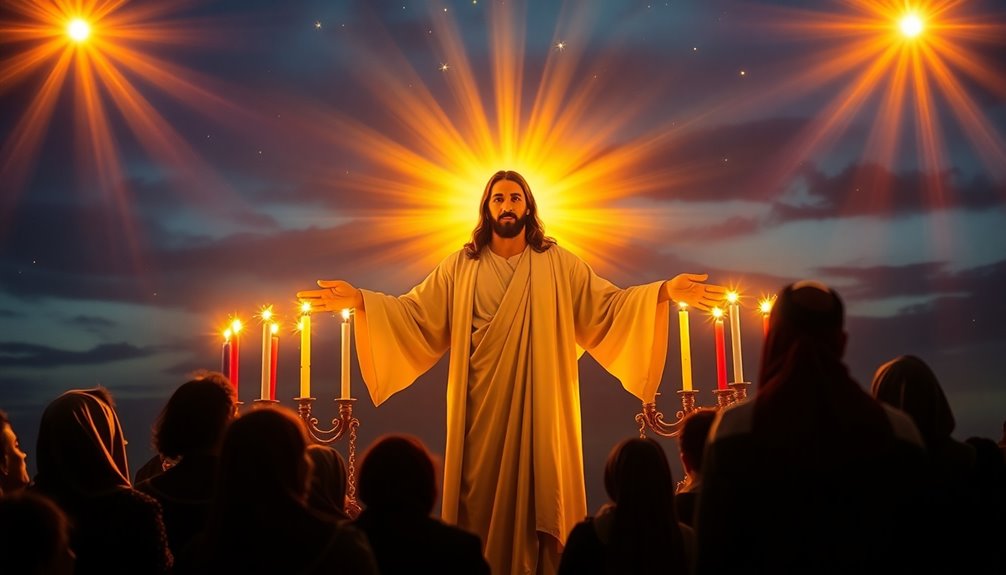
Hanukkah, often referred to as the Jewish Festival of Lights, celebrates the miraculous events surrounding the rededication of the Second Temple in Jerusalem. This eight-night festival begins on the 25th of Kislev, usually falling in late November or December.
You'll light the menorah, a beautiful nine-branched candelabrum, adding one candle each night until all eight, plus the shamash, are glowing brightly.
As you participate in this celebration, you'll notice that the light shines as a powerful symbol of hope, resilience, and faith. The miracle of the oil lasting eight days, despite only having enough for one, reflects the triumph of light over darkness.
It's a time to embrace your spiritual life, emphasizing themes of religious freedom and the importance of perseverance.
During Hanukkah, you'll also enjoy traditions like playing dreidel and savoring treats fried in oil, such as latkes and sufganiyot.
These customs not only enhance the festive atmosphere but also serve as reminders of the enduring significance of light and miracles in your life.
Celebrate this rich heritage and let the light of Hanukkah inspire you throughout the year.
Symbolism of Light in Scripture
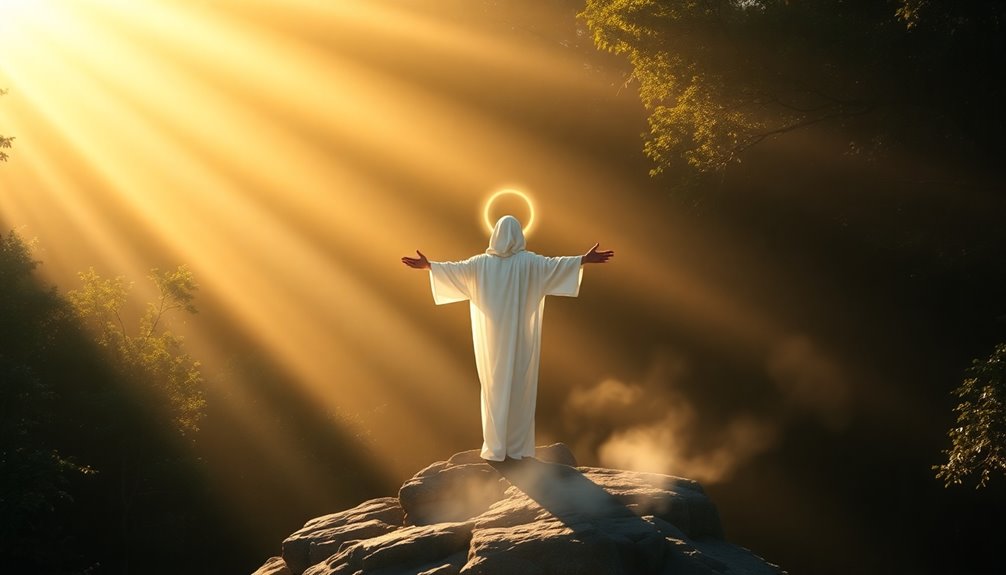
Light carries profound symbolism in scripture, representing salvation, guidance, and divine truth. Throughout the Bible, light is contrasted with darkness, which signifies sin and spiritual blindness. In John 1:4, we see that life and light are intertwined, emphasizing how essential light is for both physical and spiritual growth.
When Jesus proclaims Himself as the "light of the world" in John 8:12, He underscores His unique role as the source of spiritual illumination for everyone.
Moreover, the prophetic reference to the Messiah as the "sun of righteousness" in Malachi 4:2 reinforces light as a symbol of hope and healing. This imagery invites you to see light not just as a natural phenomenon, but as a divine gift that brings clarity and purpose to your life.
As a believer, you're also called to reflect Christ's light, showcasing good works that glorify God and help guide others out of darkness (Matthew 5:14-16). Embracing this symbolism can illuminate your path, turning your focus toward the transformative power of light, while encouraging those around you to seek the divine truth found in Jesus.
Misunderstanding Jesus' Role

You might find that many people misunderstand Jesus' role by seeing Him only as a historical figure rather than the divine "Light of the World."
This perspective can lead to skepticism about His authority and the exclusivity of His message.
Let's explore some common misconceptions and how they impact your understanding of His true significance.
Address Common Misconceptions
Many individuals hold misconceptions about Jesus' role, often seeing Him merely as a moral teacher rather than recognizing His unique claim as the exclusive source of spiritual light and truth. In John 8:12, Jesus asserts, "I am the light of the world," emphasizing that He alone dispels spiritual darkness and leads to salvation.
Some might think that following Jesus doesn't require a change in lifestyle, but true discipleship demands repentance and a commitment to live according to His teachings. This reflects the light of life through good deeds.
Additionally, believing that Jesus' light can be accessed through various means undermines the biblical truth that only He can illuminate our path to eternal life.
Many also view spiritual light as a vague concept, not realizing that it symbolizes understanding divine truth and guidance. Jesus embodies this light, showing us the way.
There's a common misunderstanding that spiritual enlightenment can be achieved independently, but the Bible clearly states that true spiritual insight requires divine enablement and a personal relationship with Him (John 6:37).
Recognizing these truths can transform your understanding of Jesus' role in your life.
Skepticism About Divine Authority
Why do so many people doubt Jesus' authority as the Light of the World? This skepticism about divine authority often stems from misunderstanding His role and mission. When Jesus declared Himself as the light, the Pharisees immediately questioned His authority, reflecting a broader confusion among the audience about His claims (John 8:13).
Many preferred their established religious traditions, resisting His radical teachings because they challenged their beliefs.
Jesus' exclusivity as the sole source of spiritual truth is another reason for this skepticism. He stated, "I am the way, the truth, and the life" (John 14:6), but this claim often provokes doubt in those who lean on their interpretations of faith.
This skepticism can lead to spiritual blindness; individuals may reject His light in favor of their own understanding (John 3:19-20).
Even today, many still grapple with accepting Jesus as the Light of the World. Misunderstanding His divine authority continues to shape belief systems, leaving many questioning the legitimacy of His claims (John 8:24).
Embracing Jesus requires confronting these doubts and opening oneself to the profound truths He offers.
Faith-Based Community Outreach

When you engage in daily acts of kindness, you reflect Jesus as the Light of the World in tangible ways.
Local service projects not only meet immediate needs but also build connections within your community.
Daily Acts of Kindness
Embracing daily acts of kindness can transform your community, reflecting the love and compassion of Jesus, the light of the world. Jesus spoke of serving others as a core principle of faith, encouraging you to engage in simple gestures that make a difference. You can help a neighbor with groceries or provide meals to those in need, embodying Christ's teachings through tangible actions.
Participating in local volunteer opportunities, like food drives or shelter assistance, allows you to address the practical needs of your community. These acts not only meet immediate needs but also foster a sense of hope among those you serve.
Organizing events like "Kindness Days" encourages everyone to perform random acts of kindness, creating a ripple effect that spreads the message of love and light. Engaging in community or group activities for support can further enhance the impact of your personal development strategies, as collective efforts amplify kindness in your community.
Sharing testimonies about how these acts have impacted individuals and families inspires others to engage in similar outreach efforts. Remember, small actions can lead to significant change.
Local Service Projects
Daily acts of kindness lay the groundwork for more structured outreach efforts, such as local service projects that embody faith-based community outreach. These projects often focus on addressing the needs of the underserved in your community, like food distribution, clothing drives, and housing assistance. By participating, you reflect Jesus' teachings on compassion and service, showing that in His light, you'll never walk in darkness.
Many churches and faith organizations partner with local charities to create volunteer opportunities. This allows you to actively engage and demonstrate the light of Christ through your actions.
Community outreach initiatives might include free health clinics, tutoring programs for children, and mental health support groups, highlighting a holistic approach to serving both physical and spiritual needs.
Building relationships within your community is vital. These connections encourage individuals to seek spiritual light and guidance from Jesus.
Moreover, these service projects can serve as platforms for evangelism, where you and others share the message of hope found in Jesus. By participating, you become a beacon of light, effectively reflecting His love and support to those in need. Together, you can truly make a difference in the world.
Final Thoughts on Light
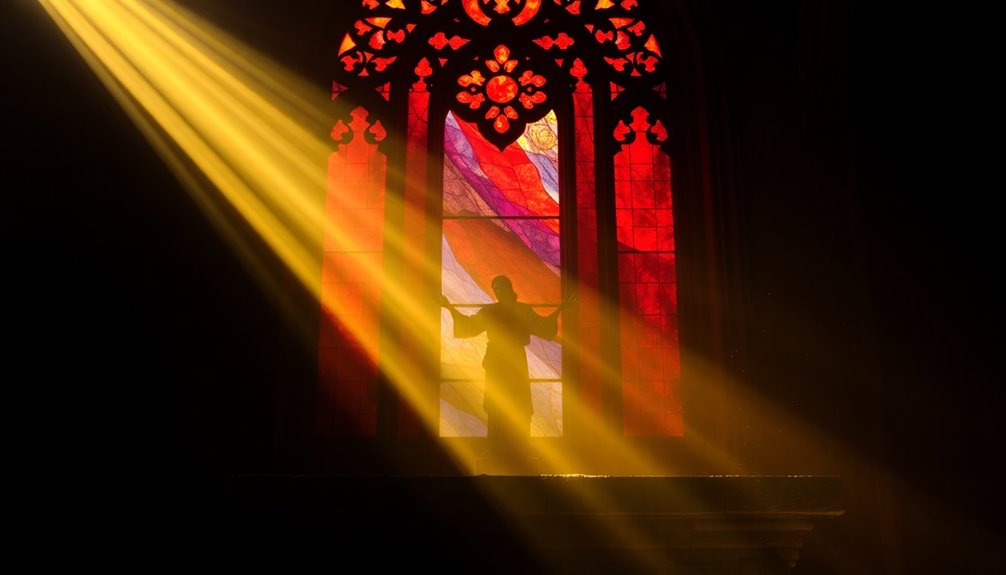
Often, we find ourselves searching for clarity amid life's challenges, and Jesus' role as "the Light of the World" offers profound reassurance. His declaration emphasizes that He's the exclusive source of spiritual truth and guidance, crucial for understanding divine realities.
When navigating through the darkness of sin, it's comforting to know that Jesus provides hope and salvation, revealing God's truth and illuminating our path.
As believers, you're called to reflect Christ's light in your life. By showcasing good works, you glorify God and serve as a testament to your faith. This reflection of light is vital, especially when facing trials and uncertainties.
Following Jesus ensures you won't walk in darkness; instead, you'll receive the guidance and strength that come from Him.
Ultimately, Jesus as the Light will culminate in the eternal presence of God. In this new creation, His glory will shine brightly, eliminating the need for physical light sources.
Embrace this truth, knowing that in every moment of darkness, the light of Christ is there to guide, protect, and uplift you toward a future filled with hope and divine illumination. Remember that His teachings often emphasize love and compassion, which serve as a foundation for living in His light.
Additional Resources
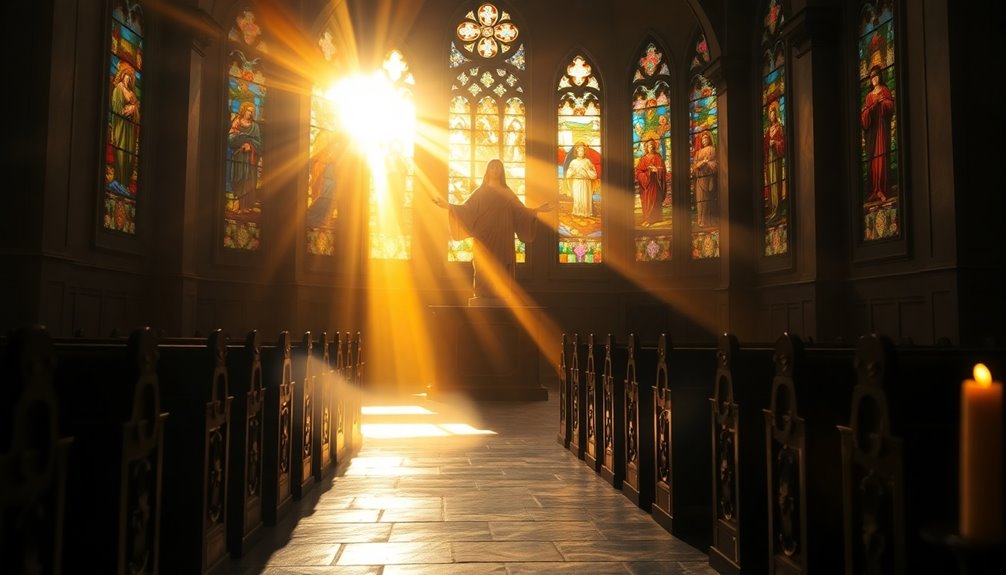
As you reflect on Jesus as the Light of the World, consider exploring additional resources that can deepen your understanding and strengthen your faith. Hymns like "Hark! The Herald Angels Sing" by Charles Wesley beautifully celebrate His role as the light, especially during the Christmas season. This hymn emphasizes themes of light, mercy, and peace, reminding you of His glorious purpose.
Diving into Scripture is essential. Passages like Isaiah 9:5 and John 12:46 illuminate Jesus' mission to bring light to the world. You'll find that Matthew 5:14-16 calls you to reflect His light through your good works, showcasing how you can glorify God in your daily life.
Engaging with supportive communities can also enhance your journey. Share hope and encouragement with those around you who may be experiencing darkness. Remember, Jesus declared, "I am the light of the world" (John 8:12), a truth that should never be taken lightly.
Lastly, immerse yourself in prayer and worship, which are powerful ways to spread His light and connect with the Word of God. Each of these resources can help you embrace Jesus more fully in your life. Additionally, understanding the importance of clear communication during a breakup can help you navigate personal challenges with grace and compassion.
Frequently Asked Questions
What Does Jesus Mean by Light of the World?
When someone refers to the "light of the world," it signifies a source of truth and guidance amidst confusion and darkness.
It represents hope, clarity, and the ability to navigate life's challenges. This light illuminates your path, helping you make wise choices and understand deeper meanings in life.
Embracing this light means you're choosing to move away from ignorance and negativity, allowing positivity and enlightenment to shine through in your journey.
What Scripture Is Jesus as the Light of the World?
When you explore scripture that highlights the concept of light, you'll find various passages emphasizing its significance.
For instance, Psalm 119:105 states, "Your word is a lamp to my feet and a light to my path."
Additionally, Isaiah 9:2 mentions, "The people walking in darkness have seen a great light."
These verses underline the importance of light as guidance and hope, illustrating how it illuminates the way for those seeking truth and direction.
What Is the Meaning of John 8 12?
In John 8:12, you encounter a powerful declaration about guidance and truth.
The verse emphasizes that following this light leads you away from darkness, symbolizing sin and confusion. It reassures you that when you embrace this light, you gain clarity and direction in your life.
This promise of illumination reflects a transformative journey, where you're not just receiving knowledge but also experiencing a profound change that brings hope and salvation.
What Is the Meaning of John 14/6?
In John 14:6, you're confronted with a profound declaration about the nature of faith and salvation.
When Jesus says He's "the way, the truth, and the life," He's emphasizing that you can find direction, reality, and spiritual sustenance in Him alone.
This statement reassures you that there's a singular path to a relationship with God.
It challenges you to trust in Him completely, especially during uncertain times, reinforcing your reliance on His guidance.

